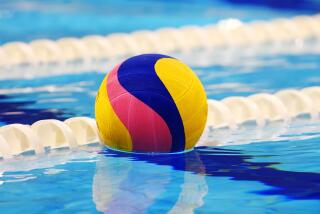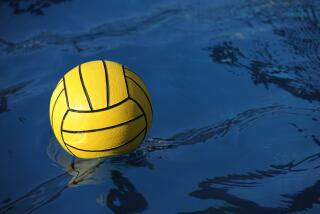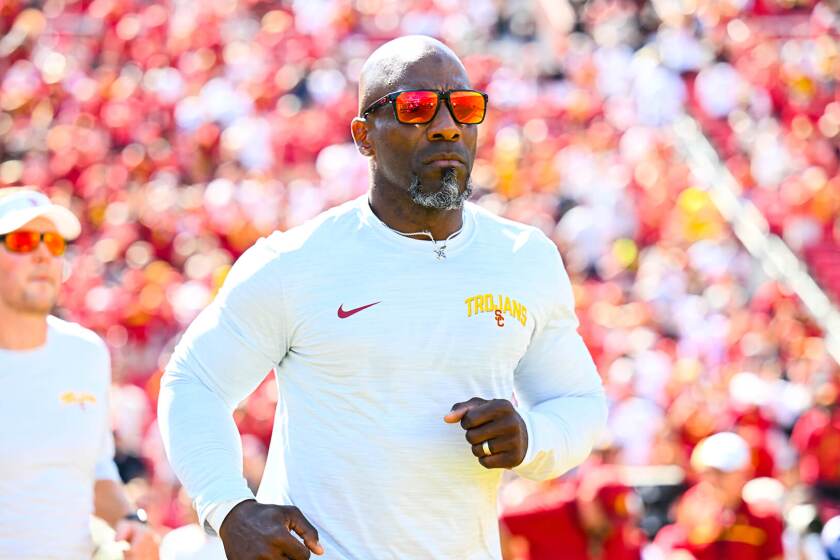Water Polo’s Troubled Waters Are No Place for the Timid : Coach, Players Pool Their Efforts for Tourney
- Share via
The water polo pool would soon be churned by young men with exquisite builds and a passion for a sport far from the mainstream. On the deck, John Williams, the coach for 15 years at the University of Southern California, looked forward to a championship.
Williams was on a streak of good fortune when he arrived last Friday morning at Belmont Plaza Olympic Pool in Long Beach for a practice before the National Collegiate Athletic Assn.’s water polo tournament.
He had recently become a father for the third time and Pac-10 Coach of the Year for the first time. His Trojans had been seeded second in the tournament and given the best chance of upsetting favored UC Berkeley.
‘Not Much I Have to Do Now’
He hoped he would be the coach tossed into the pool by the winning team on Sunday night.
“There’s not too much I have to do now,” said Williams, who had a career record of 225-156-7 but had never won the tournament. “The preparation has already been done.”
Williams was an All-American water polo player at USC in the late 1960s. While accounting has become his main source of income--the coaching job pays only $3,000 a year--the sport has remained his main source of satisfaction. The lure of the turbulent waters apparently is irresistible and forever.
Williams, of North Long Beach, is a short, blond, youthful-looking man of 39. His height of 5 feet, 7 inches makes clear how water polo players have changed the last two decades. Most of the Trojans are 6-2 or taller.
The players dived into the pool as they always do--unhesitatingly, willing to give sweat, tears and, occasionally, blood to this physically demanding sport, as Williams did in his day.
“They are independent souls,” Williams said of water polo players. “They’re always fending for themselves. We have no locker room (at USC); guys change on the deck with their towels. It is a sport with no special privileges. We do it because we love it.”
After practice, the Trojans went across the street to a motel where they would stay during the weekend. Williams could sense that they were on edge, ready to play.
“Hey, John, I can’t sleep on this bed,” complained Robert Lynn, the team’s second-leading scorer.
Williams gathered the players in a room to show them a tape on drug-testing procedures.
They wore sweats or jeans and T-shirts and most had the sun-streaked hair you expect to see when the caps that make them so anonymous in the pool are taken off.
“Where we gonna eat, John?” a player asked.
“Hamburger Henry,” Williams said. “Guys, eat light.”
On Friday night, USC devoured Navy, 17-5.
Williams, who feared a close game, was excitable. He screamed instructions as the Navy players closed in on the USC goal. He stood with hands on hips and glared.
Calmer at half time, he told the players: “Go out and play with maturity and discipline.”
After the game, he worried about having to play UCLA--whom the Trojans had beaten three times in the regular season--in the semifinals.
“It’s hard to beat a team four times in a row,” he said.
At the motel on Saturday afternoon, while his teammates waited for daylight to run out, Lynn, a junior who was an All-American last season, tried to explain his passion for water polo to a visitor.
Players are closer to one another in water polo than in other sports, he said. “Everyone on the team is good friends.”
Lynn said he first played water polo at Belmont Plaza when he was 6 years old. He played it at Wilson High School. He played it on the USA Junior National Team.
Fifteen years of being scratched, pushed and kicked. Fifteen years of swallowing water and inhaling chlorine. But also 15 years of being a star in his own little world, firing a slippery yellow volleyball into a cage.
And so the commitment is unwavering.
“I never get sick of it,” said Lynn.
Water polo is considered a macho sport, much like rugby, and causes similar pride to surface in the players.
“If I was with a basketball or football player and they asked how physical it is, I’d say come and watch it,” Lynn said. “They wouldn’t believe it. This is constant physical aggression. Your chest and shoulders are pushed the whole game.”
And Lynn knows the feeling of being elbowed in the face or kicked in the area of his Speedo trunks.
“That’s when it goes overboard, when a coach says to ‘take someone out,’ ” he said. “Once they start going for the face or down low, you’re going to retaliate and think about hurting a guy.”
Lynn, like all water polo players, regrets that the sport is so misunderstood.
He laughed and said, “(Other athletes) ask us, ‘How do you walk on the bottom so fast?’ ”
USC edged UCLA, 12-11, in an exhausting overtime game.
Players pushed and sunk one another and came up gasping for air. They swam with explosive strokes. They treaded water so effortlessly that they did look as if they were walking on the pool bottom.
Players were constantly being ejected for fouls, creating six-on-five advantages. Goals always seemed inevitable then because the undermanned team looked so vulnerable. Time seemed to freeze when a player raised himself as far as he could above the blue surface and faked and faked and faked with the ball in one hand before rifling a shot through all the spray. The goalies, however, rose to make astonishing saves, sometimes deflecting the ball high toward the stands that overflowed with spectators.
Late in the game, the Trojans huddled in front of Williams. Their hands were white and shriveled. Lynn wrapped his head in a towel. Up on a diving board, a band played.
When USC won, the players gave one another high fives in the water. Goalie Kevin Stringer climbed out of the pool and shook with fatigue and sobbed with joy that the Trojans were on the verge of their first NCAA title.
At 3 on Sunday afternoon, 4 1/2 hours before the championship game with UC Berkeley, Williams and his assistant coaches were in their motel room, analyzing a tape of a previous USC-Cal game. They also studied charts.
Williams, who had been to the final game only once, looked relaxed and talked about his feelings.
“I suppose it will be a whole lot better to win,” he said. “It’s the old story, all glory is fleeting. But for that one moment to say you were champions, it would be terrific, something special.
“My life will go on (tomorrow); I’ve got to get up and run a CPA business I’ve neglected for seven weeks and figure out how to pay for my house.”
USC took Cal to overtime before losing, 9-8. Lynn was scoreless. The Trojans had a chance to tie in the final seconds but one shot hit the crossbar and another was stopped by the goalie.
The Golden Bears went wild.
On the deck where he had stood so hopefully two days before, Williams tried to smile through the disappointment.
“We ran the right play and had the right player in the right spot,” he said. “We just couldn’t put the ball away. I thought we’d win in regulation.”
Williams’ 2-year-old son, Ryan, kept jumping around at his dad’s feet. “No, we lost, hon,” Williams told him.
And when Steve Heaston, the Cal assistant coach, came over to shake hands with Williams, it all sunk in.
Heaston was drenched from being thrown in the pool.
Williams was dry. Again.
More to Read
Go beyond the scoreboard
Get the latest on L.A.'s teams in the daily Sports Report newsletter.
You may occasionally receive promotional content from the Los Angeles Times.






